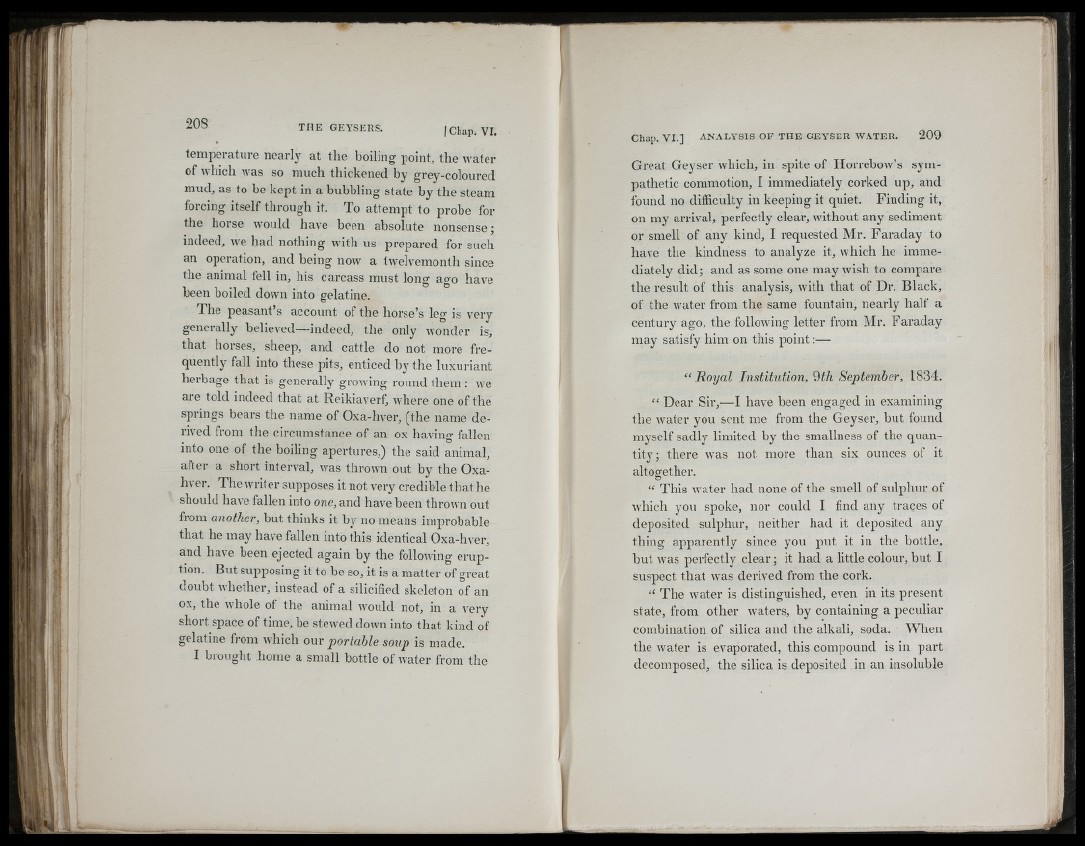
lii
J T. ft
temperature nearly at the boiling point, the water
of which was so much thickened by grey-coloured
mud, as to be kept in a bubbling state by the steam
forcing itself through it. To attempt to probe for
the horse would have been absolute nonsense;
indeed, we had nothing with us prepared for such
an operation, and being now a twelvemonth since
the animal fell in, his carcass must long ago have
been boiled down into gelatine.
The peasant’s account of the horse’s leg is A'cry
generally believed—indeed, the only wonder is,
that horses, sheep, and cattle do not more frequently
fall into these pits, enticed by the luxuriant
herbage th a t is generally growing round them ; we
are told indeed that at Reikiaverf, where one of the
springs bears the name of Oxa-hver, (the name derived
from the circumstance of an ox having fallen
into one of the boiling apertures,) the said animal,
after a short interval, was thrown out by the Oxa-
hver. The writer supposes it not very credible that he
should have fallen into one, and have been thrown out
from another, but thinks it by no means improbable
that he may have fallen into this identical Oxa-hver,
and have been ejected again by the following eruption.
But supposing it to be so, it is a matter of great
doubt whether, instead of a silicified skeleton of an
ox, the whole of the animal would not, in a very
short space of time, be stewed down into that kind of
gelatine from which our portable soup is made.
I brought home a small bottle of water from the
Great Geyser which, in spite of Horrebow’s sympathetic
commotion, I immediately corked up, and
found no difficulty in keeping it quiet. Finding it,
on my arrival, perfectly clear, without any sediment
or smell of any kind, I requested Mr. Faraday to
have the kindness to analyze it, which he immediately
did; and as some one may wish to compare
the result of this analysis, with that of Dr. Black,
of the water from the same fountain, nearly half a
century ago, the folloAving letter from Mr. Faraday
may satisfy him on this p o in t:—
“ Royal Institution, Qth September, 1834.
Dear Sir,—I have been engaged in examining
the water you sent me from the Geyser, but found
myself sadly limited by the smallness of the quantity;
there Avas not more than six ounces of it
altogether.
“ This Avater had none of the smell of sulphur of
Avhich you spoke, nor could I find any traces of
deposited sulphur, neither had it deposited any
thing apparently since you put it in the bottle,
hut Avas perfectly clear; it had a little colour, but I
suspect that Avas derived from the cork.
“ The Avater is distinguished, even in its present
state, from other Avaters, by containing a peculiar
combination of silica and the alkali, soda. When
the Avater is evaporated, this compound is in part
decomposed, the silica is deposited in an insoluble
\v